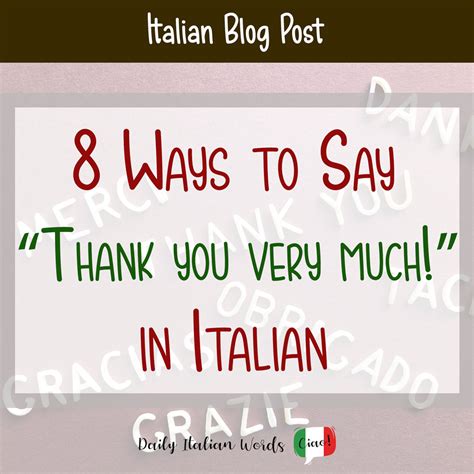How To Say Thank You in Italian: A Comprehensive Guide
Learning how to say "thank you" in a new language is one of the first steps to cultural immersion and effective communication. Italy, with its rich history and vibrant culture, offers a delightful array of ways to express your gratitude. This guide will explore various Italian phrases for "thank you," helping you choose the perfect expression for any situation.
Common Ways to Say "Thank You" in Italian
The most common and versatile way to say "thank you" in Italian is "Grazie" (pronounced GRAHT-see-eh). This is suitable for almost any situation, from receiving a small favor to expressing deep appreciation.
Example: Grazie mille! (Thank you very much!)
This is often followed by mille (a thousand), emphasizing your gratitude. You can also use tanto (a lot) instead, resulting in Grazie tante (Thank you so much).
Beyond "Grazie": Adding Nuance to Your Expression
While "Grazie" is a perfect starting point, Italian offers richer ways to express gratitude, depending on the context.
Formal Expressions of Gratitude:
-
"Grazie infinite": This translates to "infinite thanks" and conveys a deep sense of gratitude, suitable for formal occasions or expressing heartfelt appreciation.
-
"Le/La ringrazio molto": This translates to "I thank you very much" (use "Le" for a male and "La" for a female). This is a more formal and polite way to say thank you, especially when addressing someone of higher status or authority.
Informal Expressions of Gratitude:
-
"Grazie di cuore": This translates to "thanks from the heart" and conveys sincere appreciation. It’s perfect for close friends or family.
-
"Grazie per tutto": This translates to "Thank you for everything" and is appropriate for showing gratitude for extensive help or support.
Choosing the Right Phrase: Context Matters
The key to using Italian expressions of gratitude effectively lies in understanding the context. Consider the following:
-
Your relationship with the recipient: A formal expression is appropriate for strangers, colleagues, or elders, while informal phrases work better with close friends and family.
-
The level of gratitude: For a small favor, a simple "Grazie" suffices. For significant assistance, a more emphatic phrase like "Grazie infinite" is more fitting.
-
The setting: Formal occasions call for formal language, while casual interactions permit more relaxed expressions.
Beyond Words: Nonverbal Communication
Remember that nonverbal cues like a warm smile and genuine eye contact significantly enhance your expression of gratitude. These small gestures, combined with the appropriate Italian phrase, will leave a lasting positive impression.
Practice Makes Perfect
The best way to master these phrases is to practice using them in real-life situations. Don't be afraid to make mistakes; Italians appreciate the effort. Start small, and gradually incorporate more nuanced expressions into your vocabulary. Immerse yourself in the Italian language and culture, and you’ll soon find expressing your gratitude effortlessly. Buona fortuna! (Good luck!)
